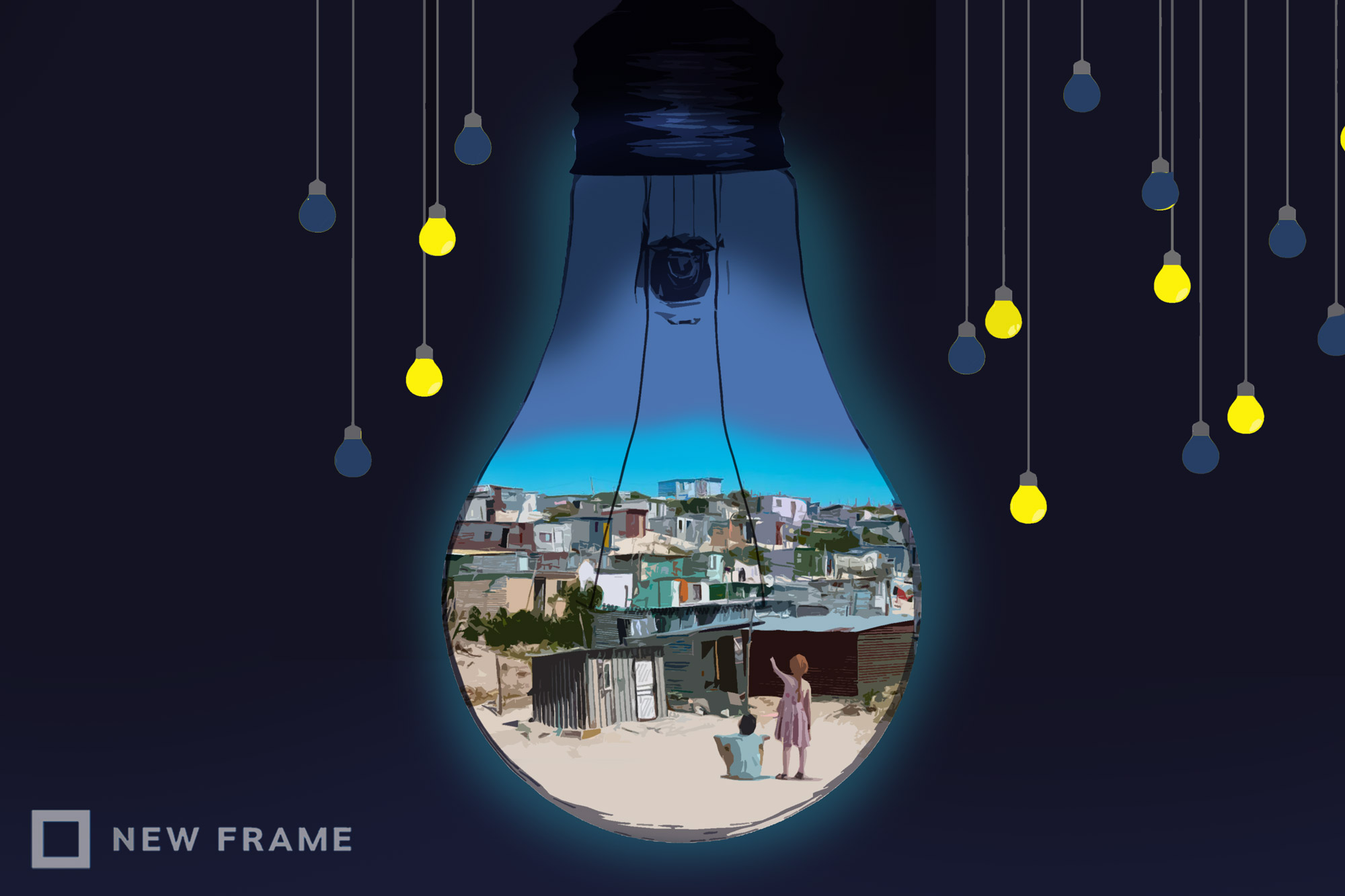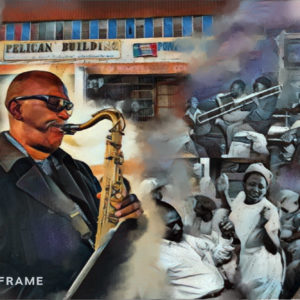Power to the people
Punishing impoverished and working-class residents for their inability to pay for electricity is unjust and immoral, especially when wealthy debtors have been getting a free ride for years.
Author:
18 February 2022

Along with battles for urban land, struggles over access to electricity have been a key point of conflict between ordinary people and the state. The government has regularly sent out men with guns when people have bypassed meters or arranged their own connections to the grid. Lives have been lost.
In perhaps the most egregious instance of the routine state violence that has rolled on for more than 25 years, two unarmed people were killed and another seven injured in October 2012 during an armed electricity disconnection carried out by municipal security guards in the New Germany shack settlement in Reservoir Hills, Durban. On the day of the murders, Mbali Mdlozini, whose cousin was killed in the attack, said “we are not animals” – a phrase that has been consistently present during street protests over the past two decades. The attack was passed over in almost complete silence by middle-class society. It was an ordinary day. There was no scandal.
Related article:
In the early years of the new century, organisations such as the Soweto Electricity Committee and the Anti-Privatisation Forum had been able to politicise the question of access to electricity and, against the relentless criminalisation of the state, to present the global practice of making self-organised connections in political terms. Activists spoke of “struggle electricians” while the state spoke of “izinyoka” (snakes). It was pointed out that while the state spoke of a “culture of non-payment”, there were whole communities where the issue was material rather than cultural: people just didn’t have the money to pay for electricity.
When these organisations collapsed, this politicisation of electricity was continued by organisations such as the Western Cape Anti-Eviction Campaign and Abahlali baseMjondolo, which was particularly concerned about the risks that the use of flame for light, cooking and warmth posed in terms of shack fires. But as the question of urban land came to the fore, electricity was no longer a central focus in organised popular struggle.
Scapegoating survival
The relish with which some in the media took up the state’s criminalisation of the survival strategies of the oppressed was seldom challenged. When Eskom, after years of being looted by Jacob Zuma’s cronies, began to impose blackouts that affected the middle classes, impoverished people who could not pay their bills, or who were accessing power outside the authority of the state, were initially scapegoated for the crisis. This dissipated when the vast scale of the looting and mismanagement of Eskom became clear.
But when the question of electricity became a crisis for elites, resolution was largely seen in terms of privatisation rather than the restoration of state integrity and capacity, let alone the more democratic routes to a social conception of electricity provision proposed by trade unionists. No thought was given to the social costs of commodification for the large numbers of working-class people employed in and around Eskom, or for the millions who could not afford another escalation of the relentless and often violent neoliberal transformation of the citizen into the consumer.
Related article:
The middle classes and elites thrill to their fantasies of business as a salvific force without understanding that, across the planet, privatisation has produced its own set of crises. There is no discussion of the energy crisis that is rapidly escalating across much of Western Europe as privatisation makes rational planning in the social and national interest impossible and pushes up prices. In the United Kingdom, where about six million people cannot afford enough energy to sustain their homes, the cost of heating increased fivefold between October 2020 and October 2021. The cost of household energy bills is expected to escalate by at least £600 (R12 228) by April and up to £1 000 by October.
A welcome reckoning
This week, the electricity crisis has appeared in a new form as the municipalities in Pretoria and Johannesburg have moved to disconnect the likes of the Pretoria Sheraton Hotel and the Sandton City mall – nodes of shining, spectacular opulence in a largely and increasingly desperately impoverished country. The amounts owed by these kinds of consumers are staggering. It has been reported that Sandton City has an outstanding municipal bill of over R168 million.
This reckoning with the impunity of wealth and power can only be welcomed, and it is no surprise that the City of Tshwane, which kicked off this campaign, was so widely and swiftly praised for its aggressive campaign to recoup the more than R17 billion it is owed for services it supplies, including water and electricity. Government departments, state-owned entities and businesses are the main culprits – with debts running into the millions, mainly for electricity.
Related article:
But the smugness dripping all over the City’s Twitter account as it names and shames the wealthy entities in its debt should be replaced with shame. After all, an abusive man showing up with an armful of roses on Valentine’s Day hardly gets a pass. That the City has, for years, given this kind of impunity to big business and government while quickly disconnecting low-income households that owe small amounts is a scandal of staggering proportions.
This is not just a Tshwane thing. It’s a nationwide problem that there are those who are treated better than others.
The harm done
Soweto has been presented for years as the biggest culprit in the deliberate non-payment for electricity while big businesses and government departments were allowed to conduct business as usual. Soweto residents endure sporadic power outages, without notice, for hours. This affects people’s health as they turn to toxic forms of heating, their ability to study at night and many livelihoods, including those enabled by small businesses that are able to pay for electricity but are affected by the blanket approach in punishing whole neighbourhoods in the township.
A young Soweto resident recently shared her pain with Radio New Frame when she explained how the electricity crisis affects her. Like many in the country, she comes from a family that cannot afford tertiary education fees and relies on the National Student Financial Aid Scheme. She is forced to not only apply for the scheme to pay for her education, but also for accommodation because the sporadic power outages make it difficult for her to study at night as she doesn’t know when, and in some instances for how long, she will be without electricity.
Related podcast:
Impoverished people are met with state violence when they seek to access electricity, a fundamental material condition for modern life. Working-class people are punished with blanket blackouts. Those in the middle class have to navigate blackouts too and struggle to pay the rapidly escalating cost of electricity. Yet nodes of real power and wealth have, for years, been granted impunity for straight-up delinquency.
Electricity should be understood as a social good and not solely as a commodity. It should be free for impoverished people and affordable for working and middle-class people. This should be subsidised by the rich, and especially the corporates that count their profits in the millions.




